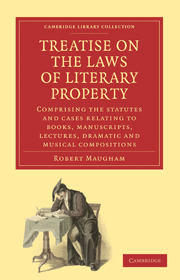 Treatise on the Laws of Literary Property
Treatise on the Laws of Literary Property Book contents
- Frontmatter
- LAWS OF LITERARY PROPERTY
- ANALYTICAL TABLE OF CONTENTS
- BOOK I HISTORICAL VIEW OF THE LAW
- BOOK II THE PRESENT STATE OF THE LAW
- BOOK III DISQUISITIONS ON THE PRINCIPLES OF THE LAWS AND THEIR EFFECT ON LITERATURE
- NOTES, COMPRISING AUTHORITIES REGARDING THE LIMITATION OF COPYRIGHT, AND THE LIBRARY TAX
- TABLE OF CASES CITED OR REFERRED TO, AND WORKS OR SUBJECTS LITIGATED
- INDEX
- ERRATA
LAWS OF LITERARY PROPERTY
Published online by Cambridge University Press: 05 August 2011
- Frontmatter
- LAWS OF LITERARY PROPERTY
- ANALYTICAL TABLE OF CONTENTS
- BOOK I HISTORICAL VIEW OF THE LAW
- BOOK II THE PRESENT STATE OF THE LAW
- BOOK III DISQUISITIONS ON THE PRINCIPLES OF THE LAWS AND THEIR EFFECT ON LITERATURE
- NOTES, COMPRISING AUTHORITIES REGARDING THE LIMITATION OF COPYRIGHT, AND THE LIBRARY TAX
- TABLE OF CASES CITED OR REFERRED TO, AND WORKS OR SUBJECTS LITIGATED
- INDEX
- ERRATA
Summary
Introduction Dissertation
The promotion of learning seems, at the earliest periods of our history, to have been a favorite object, not only of our ancestors in their individual capacity, but of our system of jurisprudence. Thus schools and colleges were established and endowed in all parts of the kingdom, by the munificence even of private men. Scarcely a town existed, where an edifice of splendour or utility (now too often crumbling to ruins) was not devoted, like the halls of classic instruction, to the purposes of intellectual improvement. It was not beneath the dignity of the law to co-operate, in a noble spirit of protection, with this general feeling towards the cultivation of letters. It was not deemed inconsistent with the policy of our legal system (however objectionable it may now appear to the legislative philosopher) to grant to the scholar a partial immunity in the administration of its criminal code, which was denied to the uneducated offender. Justice relaxed its severity in favor of Learning; and, in veneration for those rare attainments of the mind by which the world has been humanized, Mercy interposed its hand, and saved the “learned clerk” from an ignominious fate. Still further,—the prompt and efficacious remedy with which the lords of the soil had armed themselves, in the form of distress for rent, for suit, or services, was superseded, not only in favor of the needful implements of husbandry and trade, but the books of a scholar were also respected as sacred property, devoted to the service of mankind.
- Type
- Chapter
- Information
- Treatise on the Laws of Literary PropertyComprising the Statutes and Cases Relating to Books, Manuscripts, Lectures, Dramatic and Musical Compositions, pp. vii - xviiiPublisher: Cambridge University PressPrint publication year: 2010First published in: 1828


